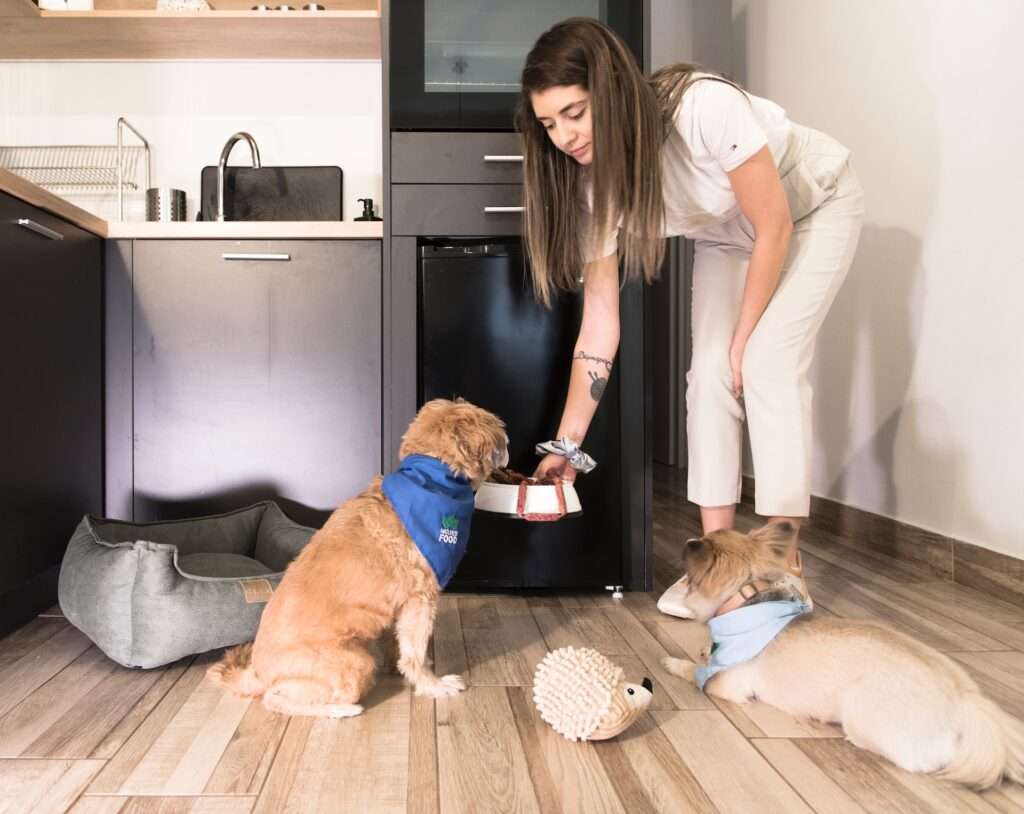What is Dog Boarding? The Ultimate Guide for Pet Owners
Are you contemplating going on vacation but uncertain about what to do with your beloved pet? Or perhaps you have a busy schedule and don’t want to leave your furry friend at home alone all day. That’s where dog boarding comes in!
Dog boarding is a service that provides a temporary home for your dog while you are away. Opting for dog boarding is an excellent decision for pet owners who want to ensure their canine companions receive the attention and care they need when they cannot provide it themselves.
This article will delve into the various types of dog boarding options available, offer guidance on choosing the right boarding facility, and provide tips for preparing your furry friend for their stay. We’ll also cover the benefits of dog boarding and the associated costs.
Upon completing this article, you will have gained valuable insights into the world of dog boarding and be equipped to make an educated decision on what’s optimal for the well-being of your beloved pet.
Types of Dog Boarding

When it comes to dog boarding, there are several options available to cater to different needs and preferences. Here are some of the most popular types of dog boarding:
- In-Home Boarding: In-home boarding offers a cozy and personalized experience for your furry friend. Your dog stays in a pet sitter’s home, receiving individual attention and care in a home-like environment. It’s a great choice for dogs who enjoy a homely atmosphere and prefer one-on-one attention.
- Kennel Boarding: Kennel boarding provides a safe and secure environment for your dog. They stay in individual kennels within a boarding facility, ensuring privacy and comfort. This option is suitable for dogs who are familiar with crate training and can socialize with other dogs.
- Pet Hotel Boarding: Pet hotel boarding offers a luxurious and pampered experience for your dog. Facilities typically provide private suites with comfortable beds and additional amenities such as playtime, grooming services, and even spa treatments. It’s ideal for dogs who enjoy extra attention and a touch of luxury during their stay.
- Dog Daycare Boarding: Dog daycare boarding is perfect for pet parents who are away during the day. Your dog spends the day at a daycare facility, engaging in supervised playtime, exercise, and socialization with other dogs. It’s a fantastic option for energetic dogs who thrive on social interaction.
- Long-Term Boarding: Long-term boarding is designed for extended periods of care, such as when pet owners are away on vacations or work trips. It provides a safe and nurturing environment for dogs during their extended stay.
When choosing a type of boarding, consider your dog’s personality, preferences, and any specific needs they may have. It’s important to research and visit potential boarding facilities, read reviews, and talk to the staff to ensure they align with your expectations.
Choosing a Boarding Facility
Selecting the perfect boarding facility for your dog is crucial to ensure their well-being and happiness while you’re away. At BarkLikeMeow, we understand the importance of finding a trustworthy and comfortable environment for your furry companion. Here are some essential factors to consider when researching and selecting a boarding facility:
- Researching Facilities: Take the time to research different boarding facilities in your area. Explore their websites, read reviews from other pet owners, and check if they have any certifications or accreditations. You can also seek recommendations from your veterinarian or trusted friends and family.
- Facility Tours: Schedule a visit to the boarding facilities you’re interested in. A personal tour will allow you to see the facility firsthand and assess its cleanliness, safety measures, and overall atmosphere. Pay attention to how the staff interacts with the dogs and observe the general demeanor of the resident pets.
- Evaluating Staff and Amenities: Engage with the facility staff and inquire about their experience and qualifications. Ask about their training in animal care, emergency procedures, and their approach to handling dogs. Inquire about the amenities they offer, such as playtime, exercise routines, and any additional services like grooming or training.
- Questions to Ask: Prepare a list of questions to ask the boarding facility staff during your visit. Inquire about their feeding schedules, policies on administering medications if needed, exercise routines, and how they handle any medical emergencies. Also, find out if they offer regular updates or pictures of your dog during their stay, so you can stay connected and at ease.
- Safety and Security: Ensure that the boarding facility has appropriate safety measures in place. Check if they have secure fencing, reliable supervision, and protocols to prevent the spread of contagious diseases. Additionally, inquire about their policies on vaccination requirements for all dogs in their care.
Always prioritize the safety and comfort of your furry family member. We encourage you to conduct thorough research, visit potential boarding facilities, and ask all the necessary questions before making a reservation. By taking these steps, you can make an informed decision and have peace of mind knowing that your dog is in capable and caring hands while you’re away.
Preparing Your Dog for Boarding
It is crucial to adequately prepare your dog for their time at a boarding facility to guarantee that they have a relaxed and hassle-free experience. Here are some tips for preparing your dog for their stay:
- Vaccinations and Health Checks: Prior to boarding, ensure that your dog is up to date on all required vaccinations and has recently undergone a thorough health checkup. This not only protects your dog but also helps maintain a healthy environment for all the dogs at the facility.
- Packing Essentials: Pack familiar items that will provide comfort to your dog during their stay. Include their favorite toys, a cozy bed, and their preferred blankets. Bringing along their regular food, treats, and any necessary medications is essential to maintain their dietary and health routines.
- Familiarize Your Dog with the Facility: Whenever possible, introduce your dog to the boarding facility beforehand. This familiarization visit allows your dog to become acquainted with the staff and the environment. It helps them feel more comfortable and at ease when they return for their actual stay.
- Reducing Separation Anxiety: Dogs may experience separation anxiety when separated from their owners. To alleviate this, leave your dog with an item that carries your scent, such as a shirt or blanket. This familiar scent can provide comfort and reassurance. Additionally, gradually acclimating your dog to being alone for short periods before their stay can help them adjust to being away from you.
- Communicate Your Dog’s Needs: Inform the boarding facility about your dog’s preferences, routines, and any specific care requirements. Providing detailed information about feeding schedules, exercise routines, and any behavioral considerations ensures that your dog receives personalized attention and care.
By implementing these recommendations, you can guarantee that your furry companion is adequately prepared for their boarding and has a delightful experience while you’re away.
Boarding Your Dog

Dog boarding is a fantastic choice for pet owners who are required to travel or take a break from their daily routine. Here are some key factors to consider when boarding your dog:
- Drop-off Procedures: Before taking your dog to the boarding facility, familiarize yourself with their specific drop-off procedures. This may include providing proof of vaccinations, completing any necessary paperwork, and discussing any special instructions or considerations. Additionally, make sure your dog has been fed and exercised before drop-off to help them settle in comfortably.
- Daily Routine and Activities: Inquire about the daily routine and activities provided at the boarding facility. Ask about their feeding schedules, exercise options, and playtime activities. Understanding their routine will allow you to prepare your dog for a seamless transition and help them feel at ease during their stay.
- Communication with the Facility: Establish clear lines of communication with the boarding facility throughout your dog’s stay. Provide emergency contact information and inform the staff of any specific needs or preferences your dog may have. Inquire about their policy for updates or concerns, so you can stay connected and informed during your time apart.
- Pick-up Procedures: Familiarize yourself with the facility’s pick-up procedures, including any required paperwork and payment. Plan your pick-up time accordingly and ensure that your dog has been properly exercised and fed before departure.
Remember to prepare your dog for their stay, establish clear communication with the facility, and confirm the pick-up procedures.
Benefits of Dog Boarding
There are several benefits to boarding your dog while you’re away. Here are some of the top benefits:
- Professional Care: Boarding facilities are staffed with trained professionals who are experienced in caring for dogs. They are equipped to handle various needs, including administering medications, monitoring health, and providing individualized attention. With their expertise, you can be confident that your dog is receiving the highest quality care.
- Socialization Opportunities: Boarding facilities offer a social environment where dogs can interact with other dogs and caring staff members. This promotes socialization skills and helps reduce anxiety, providing valuable social experiences for your furry friend.
- Exercise and Enrichment: Boarding facilities provide a range of activities and exercise options tailored to your dog’s needs. From invigorating walks to engaging playtime and even training sessions, these activities keep your dog mentally and physically stimulated. Regular exercise and enrichment contribute to their overall well-being and help prevent boredom.
- Peace of Mind: Boarding your dog offers peace of mind while you’re away. Knowing that your pup is in a safe and secure environment, receiving proper care and attention, allows you to focus on your commitments with confidence. You can relax, knowing that your beloved companion is well-cared for and surrounded by professionals who prioritize their comfort and happiness.
By choosing professional dog boarding, you can ensure that your pup receives the exceptional care they deserve, leaving you free to enjoy your time away, knowing your dog is in the best hands.
Costs of Dog Boarding
The cost of dog boarding varies depending on the type of facility and the services offered. Here are some factors that can affect the cost of dog boarding:
- Type of Boarding Facility: The type of boarding facility you choose can impact the cost. In-home boarding options may offer a more budget-friendly alternative, while pet hotel boarding facilities may have different pricing structures. Assess your dog’s needs and preferences to determine which type of facility aligns best with your budget.
- Services Offered: Additional services such as grooming, training, or extra playtime may be available at an additional cost. These services can enhance your dog’s experience and well-being during their stay. Consider your dog’s individual needs and preferences when deciding which services are worth the extra investment.
- Length of Stay: The length of your dog’s stay can also influence the cost of boarding. Some facilities may offer discounts for longer stays or have different pricing tiers based on the duration. If you anticipate an extended absence, it’s worth inquiring about any potential discounts or promotions that may apply.
It’s essential to budget for the cost of dog boarding when planning a vacation or travel. Some facilities may offer discounts for multiple dogs or longer stays. Make sure to inquire about any discounts or promotions when making a reservation.
Conclusion
When it comes to providing your dog with the care they need while you’re away, dog boarding is an excellent choice. With various facilities and services available, it’s important to invest time in researching and selecting the right option for your beloved companion.
By taking the necessary steps to prepare your dog for their boarding experience and understanding the benefits and costs associated with dog boarding, you can ensure that your pet has a comfortable and enjoyable stay while you have peace of mind during your absence.
Remember to consider factors such as the type of boarding facility, the services offered, and the length of your dog’s stay when making your decision. This will help you choose a boarding option that aligns with your dog’s needs and preferences.
Whether it’s in-home boarding, a pet hotel, or another specialized facility, the goal is to provide your dog with professional care, socialization opportunities, and a stimulating environment. This way, you can guarantee that your pet enjoys a pleasurable experience and feel loved even while you’re away.
Frequently Asked Questions
Q: What is dog boarding?
A: Dog boarding is a service provided by professional facilities where pet owners can leave their dogs temporarily when they are unable to take care of them. It offers a safe and comfortable environment for dogs to stay while their owners are away.
Q: How much is boarding a dog?
A: The cost of dog boarding can vary depending on various factors such as the location, duration of stay, and additional services offered. It’s best to contact the specific boarding facility for their pricing details. They will be able to provide you with information on their rates and any packages or discounts they may offer.
Q: How long can I board my dog?
A: The duration of dog boarding can vary based on your needs. Some facilities offer overnight boarding, while others accommodate longer stays, such as weeks or months. It’s best to check with the specific boarding facility for their policies on length of stay.
Q: Is dog boarding suitable for all dogs?
A: Most dogs can benefit from boarding, but it’s important to consider their temperament, socialization, and any specific needs they may have. Some dogs may require specialized care, such as medication administration or extra attention. Discuss your dog’s individual requirements with the boarding facility to ensure they can provide the necessary care.
Q: How do I choose a reliable dog boarding facility?
A: When selecting a dog boarding facility, consider factors such as reputation, cleanliness, staff qualifications, and the environment provided for the dogs. Visit the facility in person if possible to assess the accommodations and meet the staff. Reading reviews and asking for recommendations from trusted sources can also help in making an informed decision.
Q: What should I bring when boarding my dog?
A: Most boarding facilities have specific guidelines on what to bring for your dog’s stay. Typically, you’ll need to provide your dog’s food, medications (if applicable), and any special items they may require, such as bedding or toys. It’s important to label all belongings with your dog’s name.
Q: How are dogs supervised during their stay?
A: Professional boarding facilities have trained staff members who provide constant supervision and care for the dogs. They ensure that the dogs are fed on schedule, receive exercise and playtime, and are kept safe and secure. Some facilities may offer additional services, such as grooming or training sessions.
Q: Will my dog receive any social interaction while boarding?
A: Many boarding facilities offer socialization opportunities for dogs, such as group play sessions or individualized attention. However, this may vary depending on the facility and the specific needs of your dog. It’s advisable to discuss your dog’s socialization preferences and any concerns with the boarding facility beforehand.
Q: How can I stay updated on my dog’s well-being while they are boarded?
A: Most reputable boarding facilities provide updates on your dog’s well-being upon request. This can include regular communication through phone calls, emails, or even photo/video updates. You can discuss your preferred mode of communication and the frequency of updates with the boarding facility in advance.
Q: What if my dog has special medical needs?
A: If your dog has special medical needs, it’s crucial to inform the boarding facility in advance. Provide them with detailed instructions regarding medications, dosage, and any specific care requirements. Ensure that the facility has staff members who are trained and experienced in handling such situations.
Q: How far in advance should I book dog boarding?
A: It’s recommended to book your dog’s boarding well in advance, especially during peak seasons or holidays when availability may be limited. Booking a few weeks ahead is usually sufficient, but it’s always better to check with the facility for their specific booking policies and recommendations.
Remember, each dog boarding facility may have its own unique policies and procedures, so it’s essential to communicate directly with them to address any specific concerns or questions you may have.
References
- American Kennel Club. “Dog Boarding Tips.” AKC, https://www.akc.org/expert-advice/home-living/dog-boarding-tips-for-boarding-your-dog/.
- Pumpkin. “What Is Pet Boarding?” Pumpkin, https://www.pumpkin.care/blog/what-is-pet-boarding/.
- The Dog People by Rover.com. “How Much Does Dog Boarding Cost?” Rover.com, https://www.rover.com/blog/how-much-does-dog-boarding-cost/.
- Dogtopia. “Dog Boarding Benefits.” Dogtopia, https://www.dogtopia.com/blog/the-benefits-of-boarding-your-dog/.
Please note that the above references are provided for informational purposes and further reading on the topic of dog boarding.




